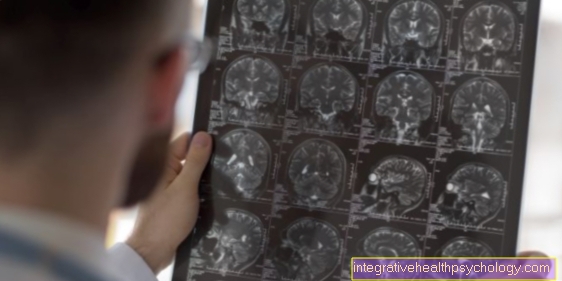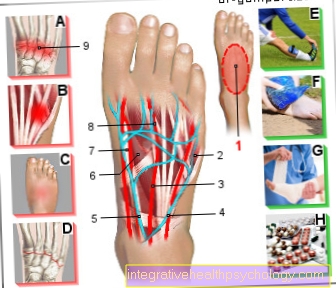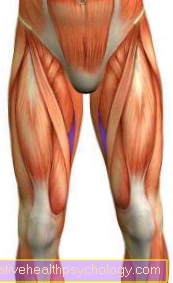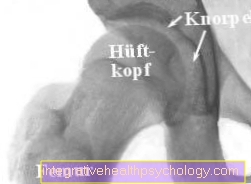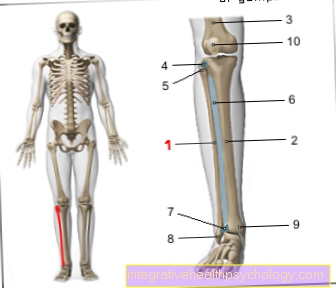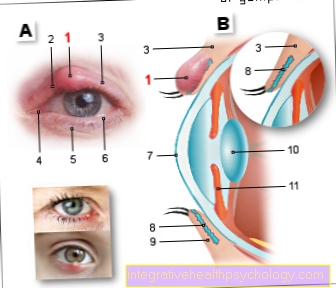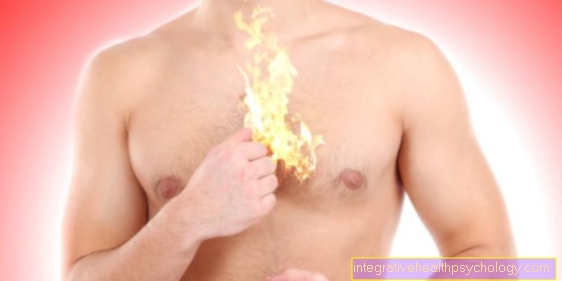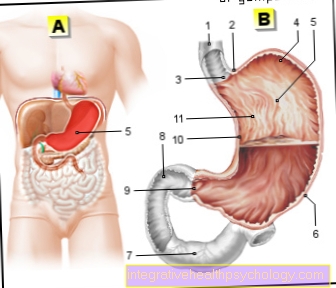Mentally induced shortness of breath
definition
Shortness of breath describes a person's subjective feeling of not getting enough air. It can or does not have to be accompanied by an actual lack of oxygen. As the name suggests, psychologically induced shortness of breath has psychological components.
A purely psychological cause can be the trigger. But there can also be a physical problem that is exacerbated by psychological factors.
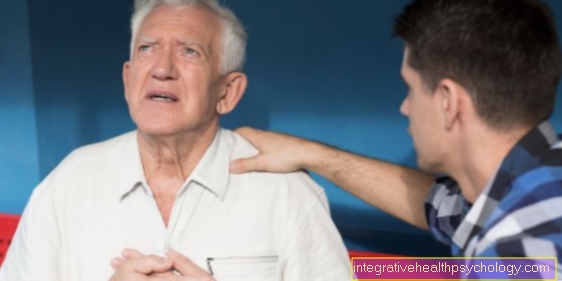
Causes of the psychologically related shortness of breath
The causes of psychologically induced shortness of breath can be very different. The most typical triggers are stress and fearful situations.
Anyone who is permanently under stress and no longer tolerates it psychologically can under certain circumstances suffer from shortness of breath.
However, this does not express an actual breathing problem. Rather, the body does not know how to help itself and expresses the actually psychological (mostly previously suppressed) complaints in physical symptoms.
In the case of breathlessness due to fear or panic, many situations can be triggering. If you have claustrophobic traits, you will automatically breathe faster in tight spaces, and fear of certain social situations (meeting with the boss, fancy dinner with important colleagues, auditioning in front of a large group, etc.) can trigger shortness of breath.
Especially people who have had bad experiences in such a situation will find themselves gasping for air automatically.
Accidents can also trigger such panic attacks. Especially people who have not dealt with such an unpleasant or dangerous situation psychologically enough later suffer more often from various complaints that always occur in connection with similar situations.
Stress as a possible symptom
Stress puts the human body in a state of emergency. This reaction stems from the primeval times of human development and leads to the fact that the body prepares to flee or fight in dangerous situations. So he adjusts to physical exertion with increased oxygen demand.
The breathing rate is increased accordingly. Although this reaction is no longer helpful in today's stressful everyday life, the body cannot help it and puts itself in a state of alarm by releasing various hormones. The increased breathing rate and other effects of the hormones can lead to a feeling of shortness of breath.
You might also be interested in: Palpitations from stress
Difficulty breathing as a possible symptom
Shortness of breath is initially a subjective feeling and is not easy to objectify, especially in the case of psychological complaints. There is often no noticeable lack of oxygen.
An increased breathing rate, on the other hand, can be found in a simple physical examination.
The diagnosis of a serious anxiety or panic disorder as well as that of a pathological state of constant stress can only be made by a psychologist or psychiatrist through detailed discussions or questionnaires.
Read more on the topic: Generalized anxiety disorder
Concomitant symptoms
Shortness of breath is a very fearful symptom. This is why the body usually reacts to psychologically induced shortness of breath with additional symptoms of fear. These include racing heart, clammy hands, and sweating.
Depending on the severity of the shortness of breath, any type of anxiety can occur, from mild anxiety to severe panic attacks.
Another possible response is hyperventilation. The affected person breathes with very fast and very deep breaths. Even though there is enough oxygen in the blood, the body breathes in more and more oxygen and releases more and more CO2 by exhaling.
This throws this system out of balance, and people get shaky and tingling hands. In acute cases, it helps to breathe into a plastic bag. As a result, the exhaled CO2 is inhaled again, at the same time not as much oxygen gets into the blood and the balance between the two components remains.
You might also be interested in: Psychogenic hyperventilation
Therapy - what can you do?
Different treatment methods can help depending on the cause of the shortness of breath. If the cause is a certain fearful situation, professional psychotherapy should slowly approach this situation. This will reduce anxiety and reduce breathlessness.
If general stress is underlying the shortness of breath, it helps first to become aware of the stressful situations. This is because fast breathing often sets in without the person concerned noticing. Only when sudden shortness of breath is felt does the person become aware of the stress.
So if you go through your everyday life more consciously, prevent stress and consciously inhale and exhale slowly in unavoidable stressful situations, you can prevent shortness of breath. For people who react to certain situations with hyperventilation, breathing into a paper bag helps in acute cases.
As a result, the exhaled air is immediately inhaled again so that the body does not take in too much oxygen and at the same time does not give off too much CO2. But calming agents can also be taken as a preventive measure and must be prescribed by a psychiatrist.
In general, it is advisable to deal more consciously with the triggering situations in order to be able to take preventive action in the event of psychologically induced shortness of breath. If this does not help, it is advisable to seek professional help in good time.
You might also be interested in: Anti-anxiety medication
Homeopathy for mentally induced shortness of breath
There are many approaches on a homeopathic basis that can be particularly helpful in combination with psychotherapy. If the shortness of breath is accompanied by oppressive feelings, lemon balm, valerian, St. John's wort or monkshood can alleviate the symptoms. Schüssler salts are also popular.
Like any other medication, the taking of homeopathic remedies should be communicated to the attending physician, as the remedies can interact with other medications and thus strengthen or weaken their effects (sometimes life-threatening!).
You might also be interested in: Homeopathy for panic attacks
Can you cure psychogenic shortness of breath in the long term?
A permanent cure of the psychologically caused shortness of breath with medication is mostly not possible.
Instead, psychotherapy can help, which consciously treats the cause of the shortness of breath and thus "defuses" any triggering situations and makes them harmless for the person concerned.
In most cases, drugs only help in the acute situation of shortness of breath, but do not solve the underlying problem. On the other hand, it is possible through psychotherapeutic therapy to permanently alleviate or even cure the shortness of breath.

